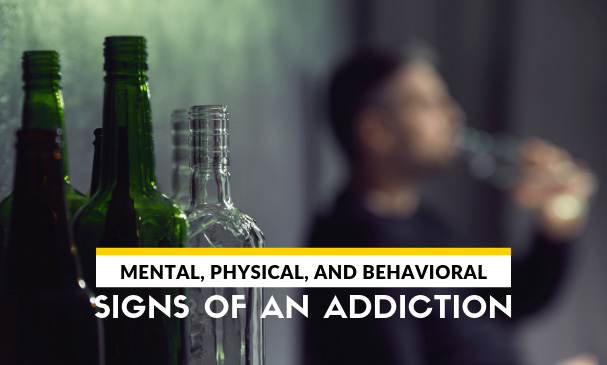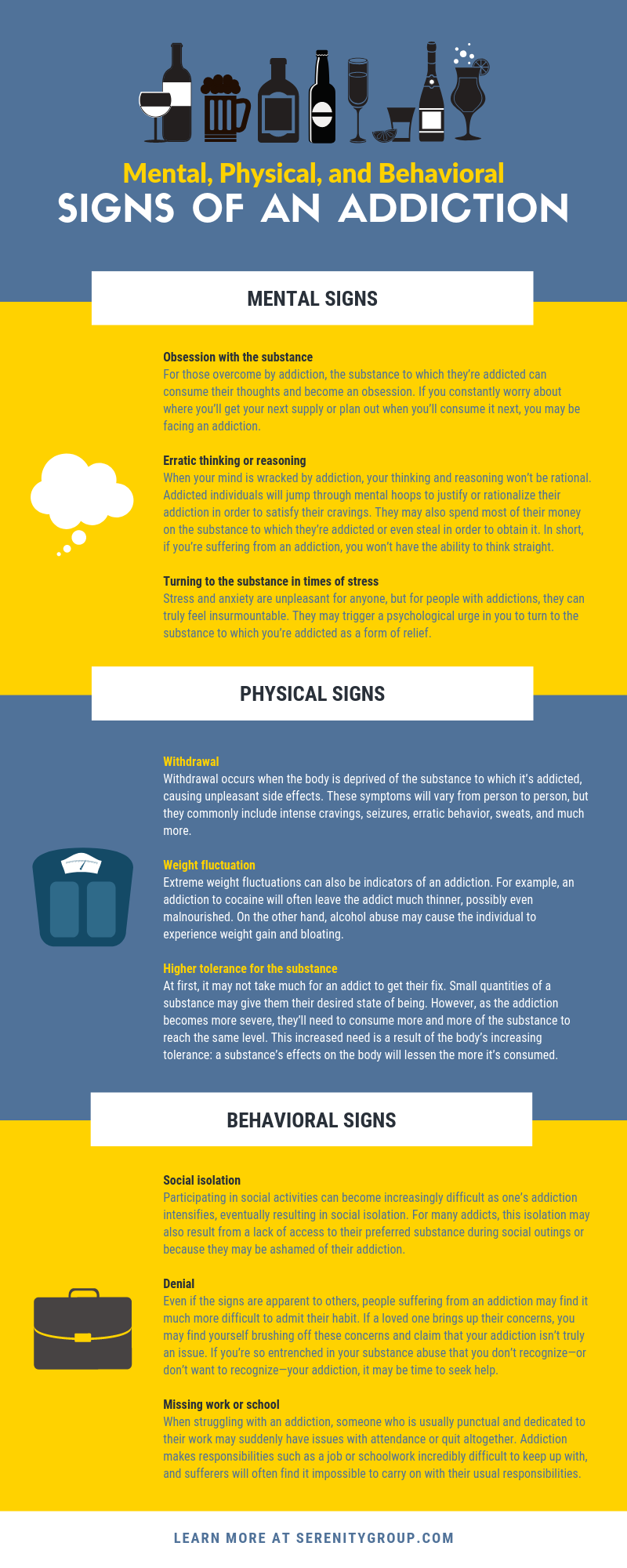Mental, Physical, and Behavioral Signs of an Addiction

Alcohol is a commonly abused substance, and its use is on the rise. In 2018, spending on alcoholic beverages in the U.S. increased by more than 5%, or approximately $12.4 billion. Correspondingly, alcohol-related deaths have increased by 35% during the past decade or so. No matter what substance is used or how an addiction manifests itself, few things are as painful as addiction. While many people think addiction is black-and-white and therefore easy to identify, it can be much more nuanced than that. Signs of addiction can be insidious and difficult to identify for both the sufferer and their loved ones. Here are some key signs to help you recognize you have an addiction so that you can take the next steps toward getting your life back.
Mental Signs
The signs of addiction may not be immediately visible or physically evident: addiction can wreak havoc on the sufferer’s mental health, as well. As such, there are several mental symptoms that could indicate an addiction:
Obsession with the substance
For those overcome by addiction, the substance to which they’re addicted can consume their thoughts and become an obsession. If you constantly worry about where you’ll get your next supply or plan out when you’ll consume it next, you may be facing an addiction.
Erratic thinking or reasoning
When your mind is wracked by addiction, your thinking and reasoning won’t be rational. Addicted individuals will jump through mental hoops to justify or rationalize their addiction in order to satisfy their cravings. They may also spend most of their money on the substance to which they’re addicted or even steal in order to obtain it. In short, if you’re suffering from an addiction, you won’t have the ability to think straight.
Turning to the substance in times of stress
Stress and anxiety are unpleasant for anyone, but for people with addictions, they can truly feel insurmountable. They may trigger a psychological urge in you to turn to the substance to which you’re addicted as a form of relief.
Physical Signs
While physical signs may not be clear at the onset of an addiction, they’ll likely become more prominent over time. Keep an eye out for any of these physical indicators if you believe you may be suffering from an addiction—even something small could be very telling.
Withdrawal
Withdrawal occurs when the body is deprived of the substance to which it’s addicted, causing unpleasant side effects. These symptoms will vary from person to person, but they commonly include intense cravings, seizures, erratic behavior, sweats, and much more. Side effects of withdrawal also wildly differ depending on the substance, so you should stay in tune with your body and remain wary of any possible signs of withdrawal.
Weight fluctuation
Extreme weight fluctuations can also be indicators of an addiction. For example, an addiction to cocaine will often leave the addict much thinner, possibly even malnourished. On the other hand, alcohol abuse may cause the individual to experience weight gain and bloating. Either extreme are a sign that you should reevaluate your substance use and really ruminate on the possibly of an addiction.
Higher tolerance for the substance
At first, it may not take much for an addict to get their fix. Small quantities of a substance may give them their desired state of being. However, as the addiction becomes more severe, they’ll need to consume more and more of the substance to reach the same level. This increased need is a result of the body’s increasing tolerance: a substance’s effects on the body will lessen the more it’s consumed. If you find yourself consuming a substance in increasing quantities and more frequently, you may be developing a higher tolerance, which can lead to addiction.
Behavioral Signs
Addiction intensely affects people not only mentally and physically, but also behaviorally. The following signs aren’t just signals of moodiness or laziness—they may also be symptoms of a serious addiction.
Social isolation
Participating in social activities can become increasingly difficult as one’s addiction intensifies, eventually resulting in social isolation. For many addicts, this isolation may also result from a lack of access to their preferred substance during social outings. Other people may be ashamed of their addiction, causing them to withdraw from their loved ones rather than allow their friends and family members to see them in that state. Whether it’s due to physical or emotional torment, if you find yourself removing yourself from social situations that once brought you joy, you may be facing an addiction.
Denial
Even if the signs are apparent to others, people suffering from an addiction may find it much more difficult to admit their habit. If a loved one brings up their concerns, you may find yourself brushing off these concerns and claim that your addiction isn’t truly an issue. If you’re so entrenched in your substance abuse that you don’t recognize—or don’t want to recognize—your addiction, it may be time to seek help.
Missing work or school
When struggling with an addiction, someone who is usually punctual and dedicated to their work may suddenly have issues with attendance or quit altogether. Addiction makes responsibilities such as a job or schoolwork incredibly difficult to keep up with, and sufferers will often find it impossible to carry on with their usual responsibilities. This could be for physical reasons such as intoxication, which can render them unable to function. This could also be because they can’t consume the substance at work. An inability to lead a normal life without the substance is a huge red flag that you’re facing an addiction.
Addiction affects every individual differently, but no matter how it manifests in you, getting yourself the help you need is important. Addiction is a disease, and you can’t overcome it alone. Confide in your loved ones, allow yourself to face the reality that you’re suffering from an addiction, and take the necessary steps to get treatment. In the moment, addiction may seem insurmountable. But you can overcome addiction and work to reclaim the life you deserve. For those who have successfully recovered from addiction and want to regain their independence, our SR22 insurance in Las Vegas, Denver, and several other areas can help you get your life back on track.


Recent Comments